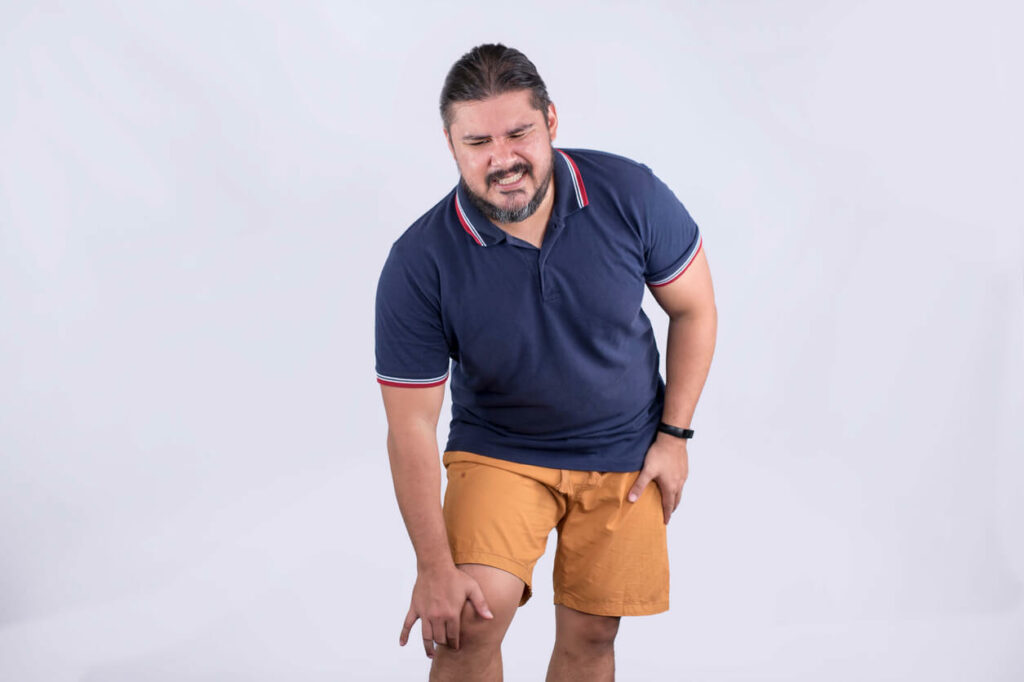
In short:
- Causes and Symptoms: They happen from twisting, sudden stops, or bad landings, causing a pop, swelling, and instability.
- Treatment and Recovery: Treatment is therapy for partial tears or surgery for full tears, with a 6-9 months recovery.
- Risks and Long-Term Effects: Untreated tears can cause arthritis, but proper care has a 90% success rate.
An ACL tear can keep athletes and active people out of action for months. The anterior cruciate ligament (ACL) in the knee connects the thighbone to the shinbone. It keeps the shin from sliding forward.
ACL tears often happen in sports with quick stops, sharp turns, or awkward landings, like basketball, soccer, football, and skiing. This FAQ answers key questions about ACL tears, including symptoms, treatments, and recovery.
1. What Is an ACL Injury Tear
The ACL is one of the main ligaments in the knee. It helps with stability and stops the shinbone from moving too far forward. When stretched too much, it can partially or completely tear.
A partial tear damages some ACL fibers, while a complete tear splits the ligament into two pieces. Most ACL injuries are complete tears.
Common causes include quick direction changes, knee impacts, or awkward landings. Most ACL tears happen without contact, often when athletes slow down quickly or pivot with their foot planted.
2. What Happens If You Tear Your ACL
Many people hear or feel a pop when the ACL tears, followed by swelling within hours. The knee may feel unstable or give out when moving.
Doctors check for ACL tears with physical tests like the Lachman and anterior drawer tests. They use these tests to see how stable the knee is. An MRI confirms the tear and checks for other damage.
If not treated, an ACL tear can cause ongoing knee instability, leading to repeated giving way. Over time, this can damage cartilage and raise the risk of arthritis.
3. Can I Walk on a Torn ACL
Many people can walk right after tearing their ACL because the thigh muscles help keep the knee stable for straight-line walking. However, movements like cutting, pivoting, or quick direction changes can feel unstable and are hard to do.
Trying to stay active without treatment can cause more damage, like injuries to the meniscus or cartilage. If you think you have torn your ACL, see a doctor right away to avoid further problems and start treatment quickly.
4. How Do You Fix an ACL Tear
Treatment options depend on several factors, including age, activity level, and tear severity. Nonsurgical treatment works for some patients with partial tears or lower activity demands.
If you prefer torn ACL treatment without surgery, these can help:
- Physical therapy to strengthen muscles
- Bracing for additional support
- Avoiding sports that stress the ACL
Surgical reconstruction represents the gold standard for active individuals. Surgeons replace the torn ACL with a graft from another part of the body. Common graft sources include:
- Patellar tendon
- Hamstring tendons
- Quadriceps tendon
5. Do You Always Need Surgery for an ACL Injury Tear
According to the Mayo Clinic, surgery is not always necessary for every ACL tear. Older patients with lower activity levels may function well with conservative treatment. Partial tears sometimes heal with proper rehabilitation.
However, complete tears in active individuals typically require surgical reconstruction. Athletes who want to return to cutting sports need ACL reconstruction. Chronic instability episodes also indicate the need for surgery.
Your orthopedic surgeon will evaluate your specific situation. Age, activity goals, and associated injuries influence the treatment recommendation.
Arthroscopic ACL reconstruction surgery may help. This method will require shorter recovery and smaller incisions.
6. How Long Is the Recovery for a Torn ACL
Recovery timelines vary significantly between nonsurgical and surgical treatment. Conservative management may allow return to activities within 6-12 weeks with proper rehabilitation.
According to the Cleveland Clinic, ACL reconstruction requires a much longer recovery period. Initial healing takes 2-3 months before aggressive rehab begins. Most patients return to sports 6-9 months after surgery.
Physical therapy plays a crucial role in both treatment approaches. Strengthening exercises restore muscle function and joint stability. Proper rehab reduces re-injury risk and improves long-term outcomes.
7. What Are the Risks of ACL Surgery
ACL reconstruction carries standard surgical risks, including infection, bleeding, and blood clots. Knee stiffness can occur if rehabilitation does not begin promptly. Some patients experience numbness around the surgical site.
Long-term concerns include graft failure and arthritis development. Graft failure is rare but possible. There is also an increased arthritis risk for 10-15 years after surgery, regardless of treatment choice.
The success rates for ACL reconstruction are high. Most patients return to their previous activity level within one year of surgery.
8. How Long Can a Person Live With an ACL Injury Tear
An ACL injury does not threaten life expectancy. However, it can impact quality of life.
Untreated tears can limit participation in recreational activities and sports. Chronic instability affects daily activities like climbing stairs or walking on uneven surfaces.
Long-term complications of untreated ACL tears include progressive cartilage damage and early arthritis. The knee joint loses its normal mechanics without ACL function. This altered movement pattern stresses other structures over time.
Proper treatment and rehab preserve long-term knee health. Early intervention prevents many complications associated with chronic ACL deficiency.
ACL Injury Tear Treatment in Dover, NJ
ACL injury tears are common but highly treatable with modern orthopedic care. The right diagnosis and treatment plan help most people recover fully from these injuries. Taking ACL injuries seriously and seeking early treatment protects your long-term knee health. Proper rehab remains essential regardless of treatment choice. With dedication to recovery, you can return to the activities you love.
Trust the board-certified orthopedic surgeons at Orthopedic Associates of West Jersey. Call us today at (973) 989-0888 or use our appointment request form to schedule your consultation today.
We look forward to serving you!

